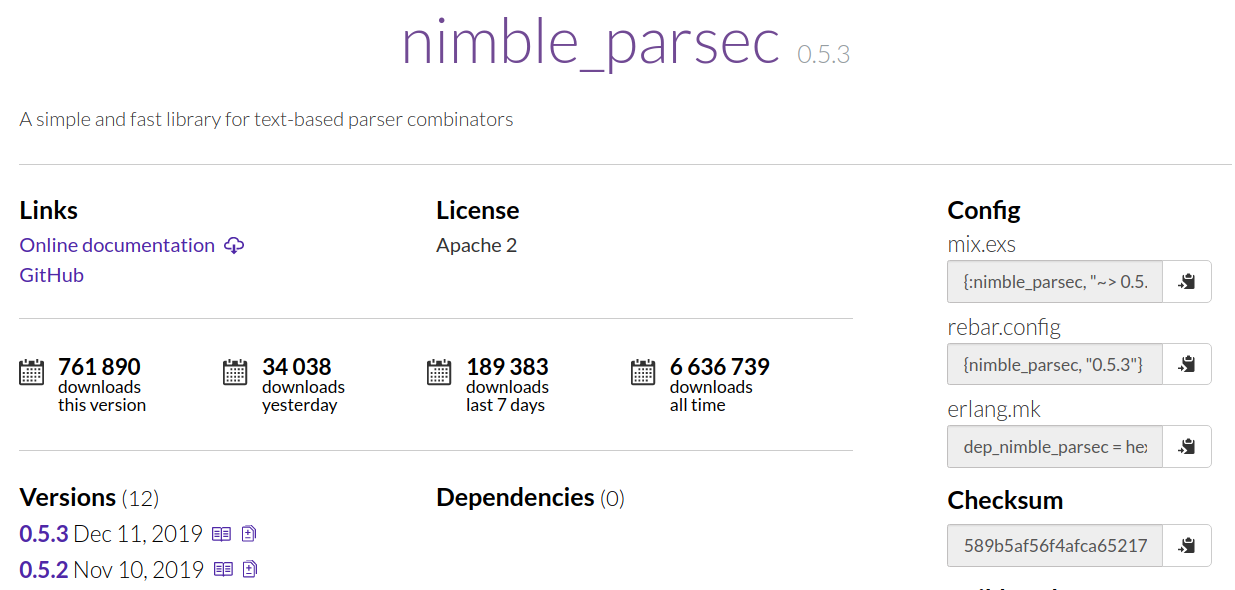Reverse Engineering for Poor
There was a question published yesterday on Stack Overflow, asking
what the alphanumeric value like
"d<i62n>2"represents in the slice ofmix.lockfile?
Well, I am kinda familiar with Elixir core code, but this is mix which I never scratched my head of. First glance at sources didn’t help much; the entry format in mix.lock looks like
"nimble_parsec": {
:hex,
:nimble_parsec,
"0.5.3",
"def21c10a9ed70ce22754fdeea0810dafd53c2db3219a0cd54cf5526377af1c6", # ??? 1
[:mix],
[],
"hexpm",
"589b5af56f4afca65217a1f3eb3fee7e79b09c40c742fddc1c312b3ac0b3399f" # ??? 2
}
There are two hashes, the latter is a checksum of the package at hex.pm (check the bottom right corner below)

but the former is something I could not grep easily. I am an inquisitive guy, so I went to source code. It quickly revealed that this is not something mix creates on its own, so I needed to understand who is the one this data is delegated to. The good entry point of investigation would be Mix.Dep.Lock.{read/0,write/1} functions.
I am aware of IEx.Pry.break/4, but sometimes a nasty hack is way more handy than the proper approach, whatever it means. So I grabbed Elixir source, compiled it with make clean test and instructed asdf to use the source distribution locally for the newly created project with a single hex dependency with asdf local elixir path:/home/am/Proyectos/elixir.
Then I went to aforementioned Mix.Dep.Lock.write/1 and amended it with
def write(map) do
...
try do
raise "BOOM"
rescue
_ ->
IO.inspect({map, __STACKTRACE__}, label: "Mix.Dep.Lock.write/1")
end
...
end
Since OTP 20, __STACKTRACE__ might be used in the context of currently handled exception to get, well, the stacktrace. I could have used Process.info(self(), :current_stacktrace) instead, but raising an exception gives more flexibility in grokking the behaviour later on (spoiler: it wasn’t necessary.) After make compile Elixir and rm -rf mix.lock deps _build && mix deps.get in my new project directory, I got the stack trace
[
{Mix.Dep.Lock, :write, 1, [file: 'lib/mix/dep/lock.ex', line: 34]},
{Mix.Dep.Fetcher, :do_finalize, 3,
[file: 'lib/mix/dep/fetcher.ex', line: 106]},
{Mix.Dep.Fetcher, :all, 3, [file: 'lib/mix/dep/fetcher.ex', line: 17]},
{Mix.Tasks.Deps.Get, :run, 1, [file: 'lib/mix/tasks/deps.get.ex', line: 31]},
...
what led me to Mix.Dep.Converger.converge/4 and then to remote.converge/2. I put another IO.inspect/2 there to confirm my expectation; yes, remote there had a value Hex.RemoteConverger.
The mystery was solved in 10 minutes and two IO.inspect/2 in the foreign code.
That said, both __STACKTRACE__ and Process.info(self(), :current_stacktrace) could tell you more of an alien code structure than all the documentation in the world.
Happy inspecting!